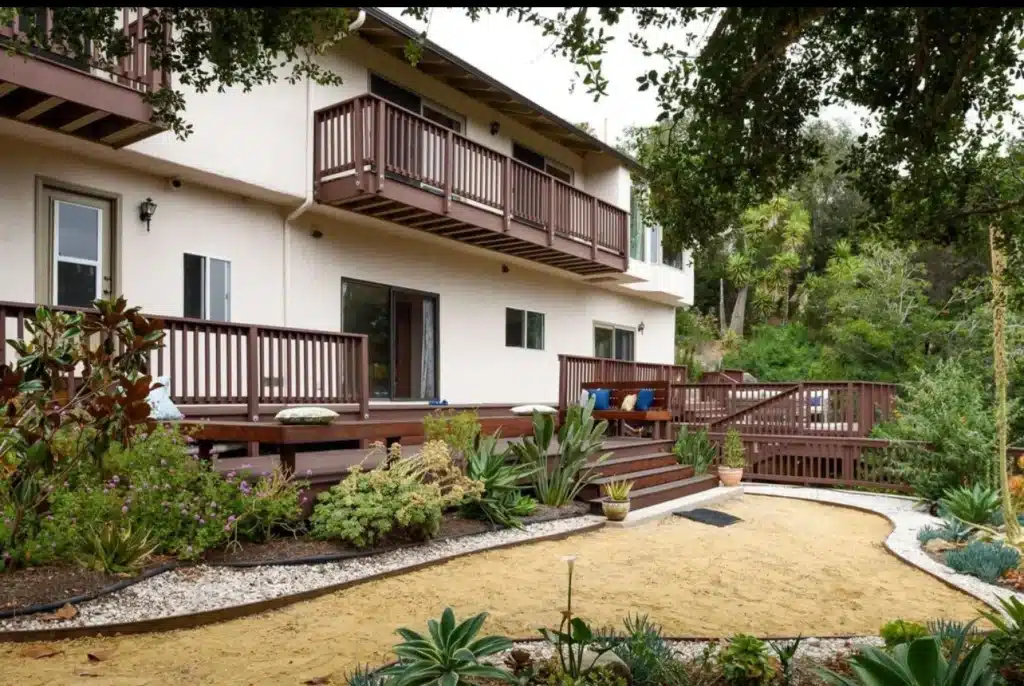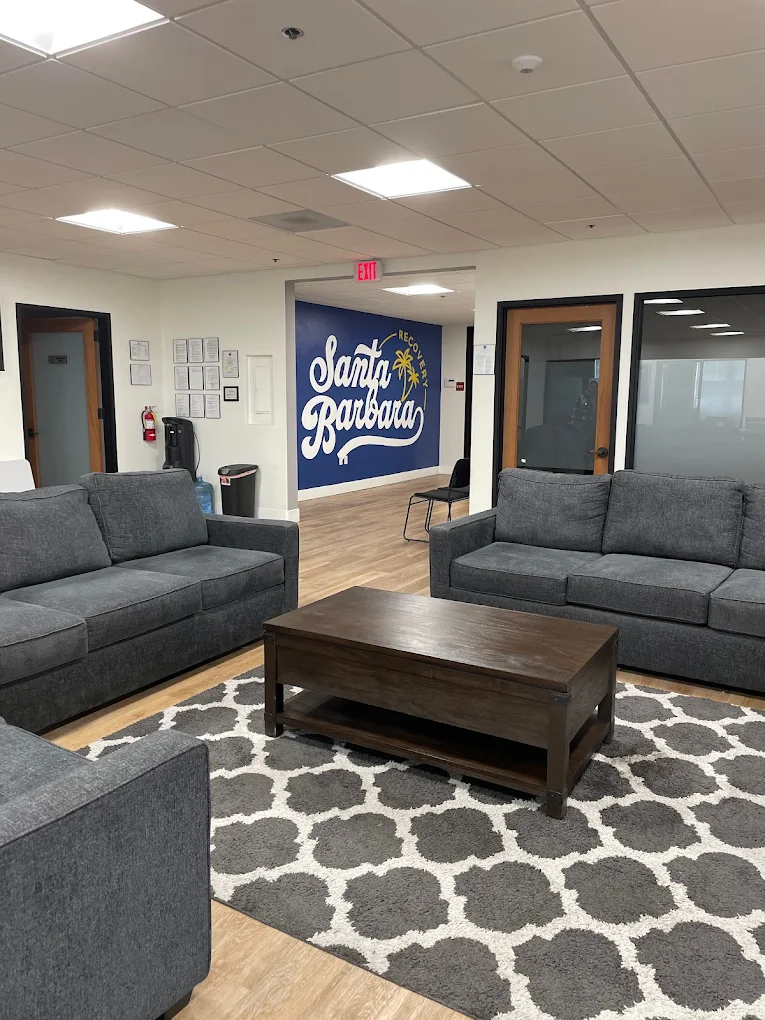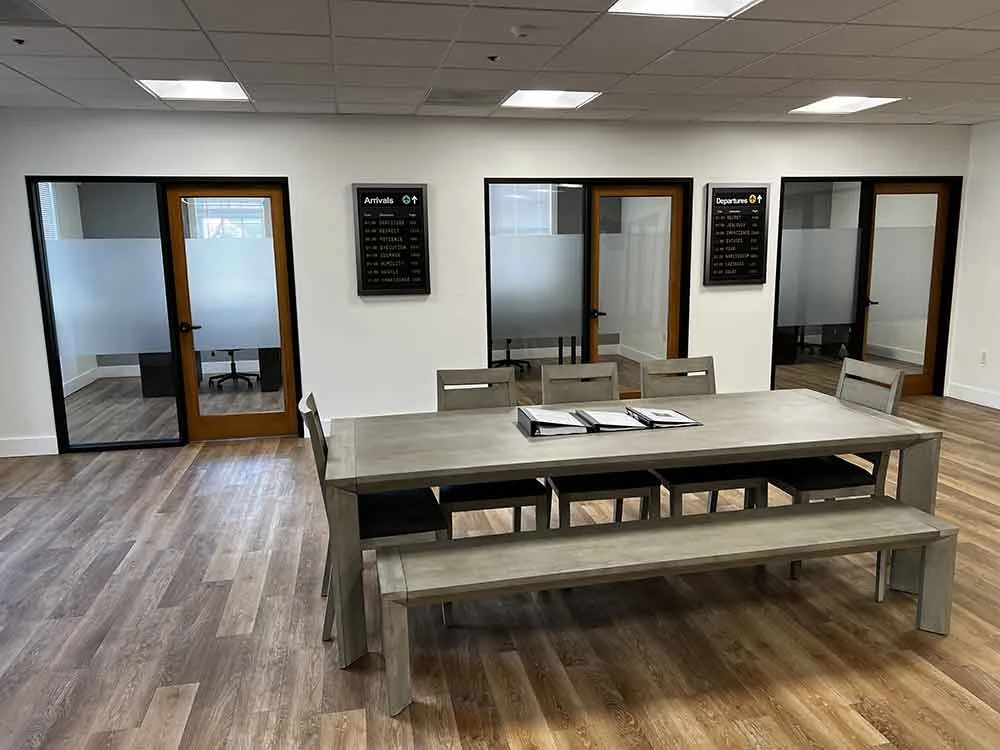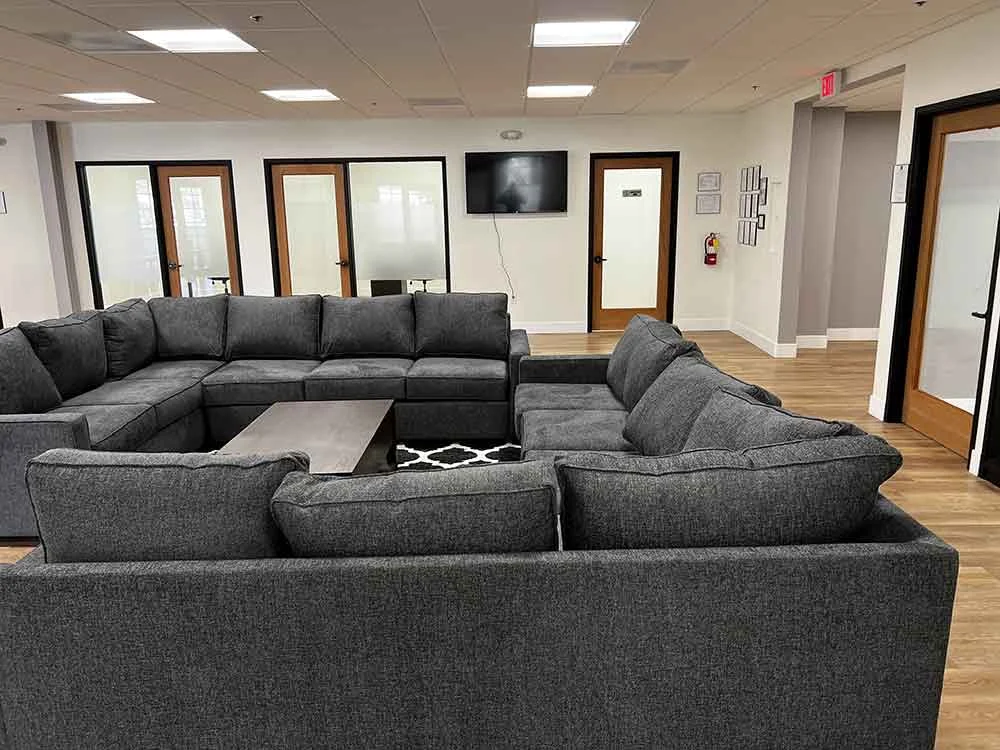Addiction can have a profound impact on not only the individual struggling but also on their loved ones. It can strain relationships, create conflict, and lead to feelings of helplessness. In these situations, seeking out family therapy for addiction can provide a supportive and effective solution for individuals and families alike.
Through open communication, education, and support, family therapy can help mend broken relationships and foster a healthier environment for recovery. Our addiction treatment programs along with our addiction therapy services make recovery easier for men and their families.
Collaborating with a proficient therapist will give you a deeper understanding of your family dynamics, help you establish healthy boundaries, and discover ways to support one another throughout recovery. Santa Barbara Recovery can help you and your family heal together.
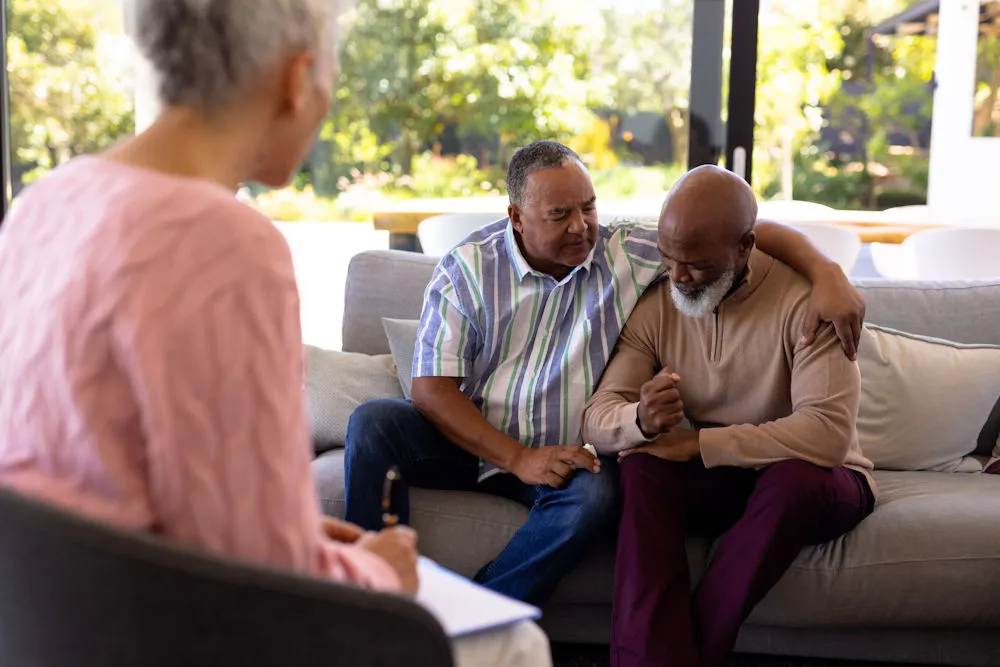
What is Family Therapy?
Family therapy is a type of psychotherapy that focuses on improving communication and resolving conflicts within a family. It is based on the belief that the family unit is a system, and any issues within the family can affect each member. Family therapy for addiction aims to strengthen relationships, promote understanding, and enhance problem-solving skills.
One of the key principles of family therapy is that behaviors and patterns within the family are interconnected. Therefore, all family members must be involved in the therapy process. This includes not only immediate family but also extended family such as grandparents, aunts, uncles, and cousins.
In other words, family therapy for addiction is designed to tackle substance abuse and addiction by analyzing the dynamics within the family unit. This therapeutic method recognizes the significant influence that a person’s family and environment have on their actions. By uniting families, communication can be enhanced, underlying issues can be brought to light, and healthy patterns of interaction can be established.
The goal of family therapy is not to assign blame or find fault with any one individual but to identify unhealthy patterns and dynamics within the family unit. Through open and honest communication, families can learn how to understand each other’s perspectives better and develop more effective ways of communicating with one another.
History of Family Therapy
The term “family therapy” was first used in the 1950s by Nathan Ackerman, often referred to as the father of family therapy. Ackerman saw families as a whole unit that needed treatment rather than just an individual. This marked a significant shift in traditional psychotherapy, which primarily focused on treating individuals.
Since then, there has been continued growth and development in various models and approaches to family therapy, including narrative therapy, solution-focused therapy, and emotionally focused therapy. The field has also expanded to include working with diverse family structures and addressing a wide range of issues such as addiction, trauma, and dual diagnosis treatment.
Today, family therapy is recognized as an effective form of treatment for a variety of mental health concerns and is widely practiced by therapists around the world. It continues to evolve and adapt to the changing needs of families in today’s society.

How Does Family Therapy Work?
The process of family therapy for addiction typically involves all members of the immediate or extended family, including parents, children, siblings, and sometimes even grandparents or other relatives. The therapist acts as a neutral facilitator, creating a safe and non-judgmental environment for each family member to express their thoughts and feelings.
During sessions, the therapist may use various techniques such as role-playing, communication exercises, and problem-solving strategies to help family members better understand each other’s perspectives and improve their ability to communicate effectively. They may also explore past experiences and dynamics within the family that could be contributing to current issues.
One key aspect of family therapy for addiction is the emphasis on systemic thinking. Systemic thinking is the understanding of how each member’s behavior affects others in the family system. This allows families to identify patterns of interaction that may be causing conflict or dysfunction and work towards changing them.
By improving communication skills and fostering a deeper understanding of one another, families can build stronger bonds that will continue beyond the therapy sessions. Our mental health and addiction treatment center in California can help you and your family get the help you deserve.
The Benefits of Family Therapy for Addiction
Addiction is a family disease that takes conflict resolution skills to help improve family dysfunction and family communication during the recovery process. The following are some benefits of family behavior therapy.
1. Promotes Family Involvement and Support: Family therapy sessions involve the participation of family members in the addiction treatment process. This promotes a sense of involvement and support from loved ones, which can have a positive impact on the individual’s recovery.
2. Addresses Underlying Issues: Addiction often has underlying causes such as trauma, unresolved conflicts, or dysfunctional family dynamics. Family therapy helps to identify and address these underlying issues, which can contribute to the development and maintenance of addictive behaviors.
3. Improves Communication Skills: Effective communication is key to maintaining healthy relationships within the family. Family therapy provides a safe and structured environment for family members to improve their communication skills, express their feelings, and constructively resolve conflicts.
4. Builds Stronger Relationships: Substance abuse can strain relationships within the family and create a sense of detachment or resentment. Family therapy helps to rebuild trust, empathy, and understanding between family members, leading to stronger and more supportive relationships.
5. Enhances Coping Skills: Drug abuse not only affects the individual but also impacts the entire family unit. Family therapy equips family members with coping skills for stress management, setting boundaries, and avoiding enabling behaviors that may contribute to relapse.
6. Provides Education on Addiction: Many families struggle to understand addiction and its effects on their loved ones. Through education provided in family therapy sessions, family members can gain a better understanding of addiction as a disease and learn how to best support their loved one in recovery.
7. Prevents Relapse: Maintaining sobriety is an ongoing process that requires continuous support from loved ones. Family therapy helps families develop relapse prevention strategies by identifying triggers, creating a supportive environment at home, and establishing clear boundaries for all members.
8. Strengthens Overall Treatment Outcome: Studies have shown that involving families in addiction treatment can significantly improve treatment outcomes for individuals struggling with substance use disorders. Family therapy compliments individual treatment by addressing familial factors that can contribute to relapse and promote long-term recovery.
Everyone is affected by substance abuse. That’s why family counseling yields the best results when the entire family is dedicated to the process. Although it may pose challenges, striving to create a nurturing family setting is crucial for rehabilitation and sustaining lasting abstinence. Emphasizing transparent and sincere communication is promoted, enabling family members to tackle issues, comprehend each other’s viewpoints, and devise plans to support their loved one’s path to well-being. Through dedication and perseverance, our addiction therapy programs in Santa Barbara, CA have the potential to transform lives for all parties involved.

The Goals of Family Therapy for Addiction
The goals of family therapy for addiction are multifaceted and focus on improving the overall functioning and well-being of both the individuals struggling with addiction and family conflict between members. Some specific goals include:
1. Addressing family dynamics: Family counseling aims to uncover and address any dysfunctional patterns of communication or behavior within the family that may contribute to or perpetuate the addictive behavior.
2. Promoting understanding and empathy: Involving all family members in therapy, provides an opportunity for them to gain a better understanding of each other’s perspectives and experiences, fostering empathy and compassion.
3. Establishing healthy boundaries: Family therapy can help establish clear boundaries between family members, which can be beneficial in preventing enabling behaviors or codependency.
4. Building a support system: Family therapy encourages the involvement of support groups during recovery, such as close friends or extended family members, to provide additional support.
5. Improving communication: Effective communication is vital in addressing and resolving conflicts within families affected by addiction. Family therapy helps improve communication skills among family members, promoting open and honest dialogue.
6. Educating about addiction: Family therapy provides education about addiction, its causes, and its impact on both the individual struggling with addiction and their loved ones. This knowledge can aid in developing effective coping strategies for all involved.
7. Facilitating healing: Addiction can cause deep wounds within families, leading to strained relationships and unresolved trauma. Family therapy provides a safe space for healing old wounds, repairing damaged relationships, and moving forward together as a stronger unit.
Who is a Candidate for Family Therapy?
Family counseling can benefit a wide range of individuals, including children, adolescents, adults, and the elderly. It is especially useful for families experiencing difficulties in communication, conflict resolution, or major life transitions such as divorce or loss of a loved one. Additionally, families with members who are struggling with mental health issues, drug abuse, or behavioral problems can also benefit from a substance abuse treatment such as family behavioral therapy.
Anyone seeking to improve their family relationships and promote better communication and understanding among family members can be a candidate for family therapy. It is important to note that family support is crucial during the therapeutic process for it to be effective. Not all families are eligible for or will find value in therapy. Families that are best suited for family therapy usually consist of individuals including:
- Substance abuse issues
- Relationship challenges
- Mental health concerns
- Life transitions
- Blended families
- Adolescent substance abuse issues
- Grief and loss
- Chronic illness
- Communication problems
- Preventative support
- Parent-child conflicts
- Cultural challenges
Family therapy for addiction offers a flexible method to create a secure and encouraging environment for tackling problems, enhancing communication, and nurturing stronger relationships within the family. The choice to pursue family assistance should be determined by the unique requirements and objectives of both the individual and the entire family.
Finding the Right Family Therapist
When it comes to finding the right family therapist, there are a few key factors to consider. First, it is important to determine what type of therapy approach or techniques you are looking for. Some therapists may specialize in methods such as cognitive-behavioral or psychodynamic therapy.
Next, consider the therapist’s area of expertise and experience with working with families. You may want to look for a therapist who has experience in dealing with your particular family dynamic or issues that your family is facing. It is also important to consider the therapist’s credentials and qualifications. Look for a licensed therapist who has received proper training and provides family education and therapy.
Remember, finding the right family therapist may take some time and effort but it is well worth it for the benefit of your family’s mental health and wellbeing. Don’t hesitate to shop around until you find a therapist who feels like the right fit for you and your loved ones. Here are some things to consider when looking for the best counseling:

- Qualifications and Background
Seek out a certified family therapist who has a background in addressing substance use disorders and addiction. Therapists who hold qualifications such as LMFT (Licensed Marriage and Family Therapist) or LCSW (Licensed Clinical Social Worker) have undergone thorough training and education in family dynamics and addiction. Check if the therapist also possesses supplementary certifications in modalities like cognitive-behavioral therapy (CBT), a commonly utilized approach in addiction therapy.
- Substance Abuse Treatment Approach
The therapist must adopt a comprehensive, family-focused strategy for therapy. It is essential to assess the overall family dynamics and the effects of addiction on relationships. Therapy should encompass the entire family unit, not solely the individual struggling with addiction. Emphasis should be placed on enhancing communication, establishing healthy boundaries, restoring trust, and acquiring techniques to promote sobriety.
- Compatibility
It is crucial to locate a therapist with whom you can establish a connection and feel at ease sharing your thoughts and feelings. Take into account factors such as the therapist’s communication style, gender, cultural background, and whether they create a sense of judgment or understanding. Do not hesitate to inquire about their expertise, credentials, treatment approach, and track record. It is important to ensure that their methods are in line with the needs and values of your family.
- Continuity of Care
When selecting a family therapist for addiction treatment, it is important to assess their capacity to provide reliable care. Make sure to ask about appointment times that align with your family’s timetable. Consistent sessions play a crucial role in monitoring advancements and tackling obstacles. Additionally, talk about crisis intervention and assistance during emergencies or relapse occurrences. A therapist who delivers thorough, extended care guarantees continuous aid for your family’s path to recovery, enhancing positive results and lasting sobriety.
- Cost and Insurance
Inquire with your provider about insurance options for addiction treatment. Many plans include either partial or full coverage. The cost of therapy sessions can vary from $100 to $200. Do not let the cost prevent you from seeking help. There are also affordable options available. The most important thing is to find a therapist you trust, who has experience with addiction, and who will work to strengthen and support your entire family. With the right help, our family therapy programs can be an incredibly powerful tool for overcoming addiction and rebuilding relationships.
Addiction Therapy Services Are Available at Santa Barbara Recovery
In the state of California, family therapy is frequently utilized in conjunction with individual treatment for substance use disorders. If you or a loved one is grappling with a substance use disorder, family counseling could be a beneficial avenue to explore.
Although it may initially seem daunting or uncomfortable, family therapy for addiction has the potential to be a transformative form of treatment. Discover how our addiction treatment programs in California can enhance family relationships. Do not hesitate to pursue the treatment that you and your family require.
At Santa Barbara Recovery, our goal is to create a safe and non-judgmental space where families can come together to heal, grow, and support each other through the recovery journey. We believe that involving loved ones in the treatment process is crucial for long-term success in recovery.
If you or a loved one is struggling with addiction, don’t hesitate to get the help you deserve. Contact us today to learn more about family therapy for addiction in California.


